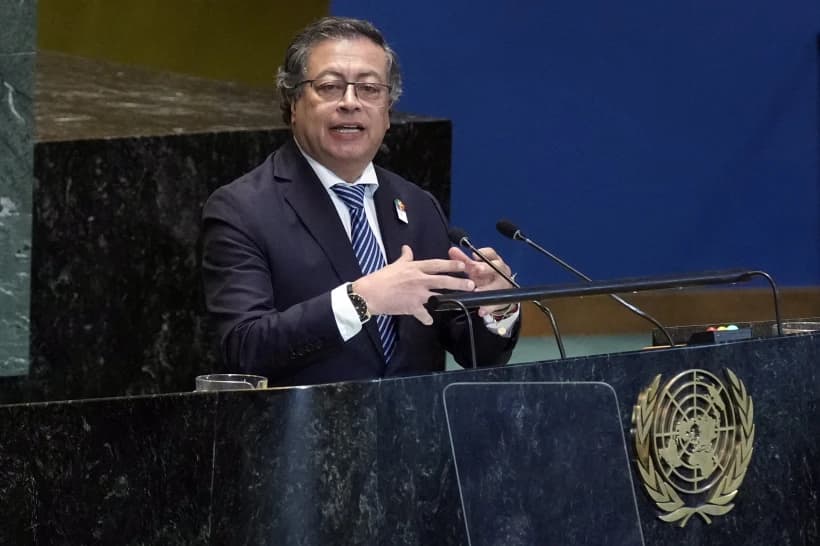SÃO PAULO, Brazil – In Colombia, the Church is still insisting on the resumption of peace talks between President Gustavo Petro’s administration and the left-wing guerrilla organization National Liberation Army (ELN), despite a major crisis in the negotiations.
Over the past few weeks, serious attacks on military targets by the ELN have virtually put an end to any possible reinstitution of the dialogue between the government and the guerrillas, which has been mediated by the Church since it began in 2022.
A ceasefire kept by both parties for a year ended in August and hasn’t been extended. Shortly after the expiration, the ELN launched a number of operations against the armed forces. At the beginning of September, two soldiers were killed in an attack on a road in Arauca, a region on the border with Venezuela.
Two days later, the group exploded a section of an oil pipeline in Boyacá, also on the border with Venezuela. The structure, controlled by the State oil company, was partially interrupted and spilled oil into nearby rivers, causing an environmental problem.
The most shocking attack occurred on Sept. 17, when guerrillas launched explosives on a military base in Puerto Jordán, Arauca, killing two soldiers and injuring 26 others. President Petro declared on that day that it was “an action that practically closed a peace process with blood.”
The talks had been paralyzed because the ELN accused the government of failing to comply with some of the conditions presented by them, especially the removal of the guerrilla group from the list of Organized Armed Groups – a classification that includes criminal gangs.
Divisions in the ELN, with the uprising of a battalion in the southern part of the country – which also began its own peace talks with the government – complicated the scenario as well.
Despite so many obstacles, Petro told the press during his trip to the United States, on Sept. 24, that “the ball is in their [ELN] camp now.”
“It’s up to them. Either they throw away peace or they build it,” the president said.
The Church is not willing to let the whole process be easily discarded by any of the parties involved in it. On Sept. 23, the heads of the Bishops’ Conference released a letter concerning the negotiations.
Addressed to the government and the guerrilla organization, the document read that the Church feels “the calling to foment fraternity among all Colombians and the unity of the nation in the pursuit of common good.”
“We value and encourage, as a sign of hope, the historical task that you have taken to make progress in a peace project, with the society’s participation and options of relief, dynamics, and humanitarian actions that have been agreed since the beginning,” wrotes the signatories, Archbishop Francisco Múnera of Cartagena, the Conference’s president, Archbishop Gabriel Villa Vahos of Tunja, the Conference’s vice president, and Bishop German Medina of Engativá, the Conference’s secretary-general.
The bishops asked the parties to keep a channel of communications in order to dialogue in “a moment of difficulty” and urged them to meet again, so they can make progress and benefit the communities caught in the middle of the confrontations.
“We consider that it’s fundamental to unfreeze the negotiation table in order to keep developing the agreements that have been reached, thus responding to the people’s cry concerning the ceasefire,” the letter went on.
According to Father Hector Henao, a long-time peace negotiator in Colombia who represents the Church in those dialogues, “the peace talks have not been lost yet, but both parties have to take steps in order to resume them.”
“Of course, the attacks on the Venezuelan border transformed the landscape. Things are much more complex now. The public opinion received them with great concern, especially because there were fatal victims,” Henao told Crux.
But there seems to be disposition from the government and from the ELN to resume the negotiations. Petro, himself the former member of a guerrilla group, has, since his campaign, insisted on the need to reach total peace in Colombia.
Not only his former organization, the M-19, agreed to leave the guns behind and become a formal political group in 1990, but also the Revolutionary Armed Forces of Colombia (FARC), once the largest left-wing guerrilla in the country with up to 10,000 members, did so in 2016.
“We have hope that they can find solutions and alternative paths to deal with the obstacles and go back to the negotiation table,” Henao said.
He said that the Church maintains channels of communication with the ELN and has been sending all declarations and letters from the bishops to the organization.
“That’s a major task for us and for them. We’ll keep insisting,” he said.














